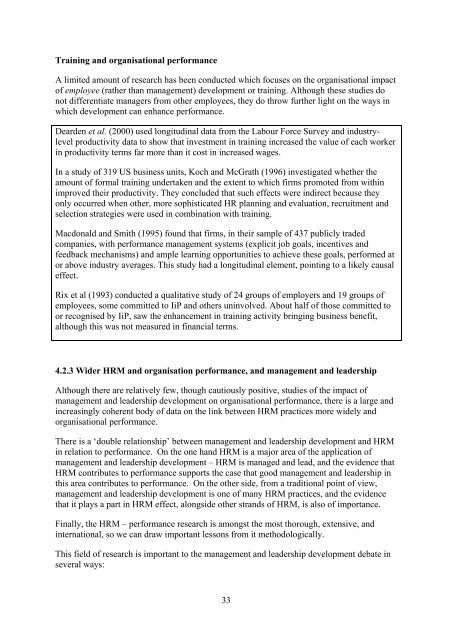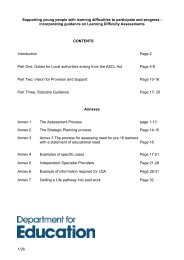The Development of Management and Leadership Capability and its ...
The Development of Management and Leadership Capability and its ...
The Development of Management and Leadership Capability and its ...
Create successful ePaper yourself
Turn your PDF publications into a flip-book with our unique Google optimized e-Paper software.
Training <strong>and</strong> organisational performance<br />
A limited amount <strong>of</strong> research has been conducted which focuses on the organisational impact<br />
<strong>of</strong> employee (rather than management) development or training. Although these studies do<br />
not differentiate managers from other employees, they do throw further light on the ways in<br />
which development can enhance performance.<br />
Dearden et al. (2000) used longitudinal data from the Labour Force Survey <strong>and</strong> industrylevel<br />
productivity data to show that investment in training increased the value <strong>of</strong> each worker<br />
in productivity terms far more than it cost in increased wages.<br />
In a study <strong>of</strong> 319 US business un<strong>its</strong>, Koch <strong>and</strong> McGrath (1996) investigated whether the<br />
amount <strong>of</strong> formal training undertaken <strong>and</strong> the extent to which firms promoted from within<br />
improved their productivity. <strong>The</strong>y concluded that such effects were indirect because they<br />
only occurred when other, more sophisticated HR planning <strong>and</strong> evaluation, recruitment <strong>and</strong><br />
selection strategies were used in combination with training.<br />
Macdonald <strong>and</strong> Smith (1995) found that firms, in their sample <strong>of</strong> 437 publicly traded<br />
companies, with performance management systems (explicit job goals, incentives <strong>and</strong><br />
feedback mechanisms) <strong>and</strong> ample learning opportunities to achieve these goals, performed at<br />
or above industry averages. This study had a longitudinal element, pointing to a likely causal<br />
effect.<br />
Rix et al (1993) conducted a qualitative study <strong>of</strong> 24 groups <strong>of</strong> employers <strong>and</strong> 19 groups <strong>of</strong><br />
employees, some committed to IiP <strong>and</strong> others uninvolved. About half <strong>of</strong> those committed to<br />
or recognised by IiP, saw the enhancement in training activity bringing business benefit,<br />
although this was not measured in financial terms.<br />
4.2.3 Wider HRM <strong>and</strong> organisation performance, <strong>and</strong> management <strong>and</strong> leadership<br />
Although there are relatively few, though cautiously positive, studies <strong>of</strong> the impact <strong>of</strong><br />
management <strong>and</strong> leadership development on organisational performance, there is a large <strong>and</strong><br />
increasingly coherent body <strong>of</strong> data on the link between HRM practices more widely <strong>and</strong><br />
organisational performance.<br />
<strong>The</strong>re is a ‘double relationship’ between management <strong>and</strong> leadership development <strong>and</strong> HRM<br />
in relation to performance. On the one h<strong>and</strong> HRM is a major area <strong>of</strong> the application <strong>of</strong><br />
management <strong>and</strong> leadership development – HRM is managed <strong>and</strong> lead, <strong>and</strong> the evidence that<br />
HRM contributes to performance supports the case that good management <strong>and</strong> leadership in<br />
this area contributes to performance. On the other side, from a traditional point <strong>of</strong> view,<br />
management <strong>and</strong> leadership development is one <strong>of</strong> many HRM practices, <strong>and</strong> the evidence<br />
that it plays a part in HRM effect, alongside other str<strong>and</strong>s <strong>of</strong> HRM, is also <strong>of</strong> importance.<br />
Finally, the HRM – performance research is amongst the most thorough, extensive, <strong>and</strong><br />
international, so we can draw important lessons from it methodologically.<br />
This field <strong>of</strong> research is important to the management <strong>and</strong> leadership development debate in<br />
several ways:<br />
33
















